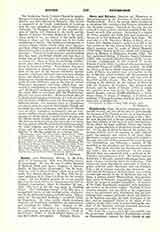

Rutter (vere BANISTER), HENRY, b. February 26, 1755; d. September 17, 1838, near Dodding Green, Westmoreland. He was the son of Adam Banister of Hesketh Bank and Agnes, daughter of Richard Butler, of Mawdesley (Lancashire). On September 26, 1768, he went to Douai College, where he found his uncle, Rev. Robert Banister. In May, 1781, he became professor at St. Omer’s College for the secular clergy. On the English mission, he served several places in the north before his appointment in 1817 to Yealand (Lancashire), where he remained till January, 1834. The rest of his life was spent at Dodding Green. The “Orthodox Journal” (VII, 223) gives a sympathetic notice of this sterling priest, characterized by his old-world learning and solid piety. Rutter wrote an “Evangelical Harmony“, reedited (1857) by Husenbeth. His other works, chiefly scriptural exegeses and devotional translations, are enumerated and described by Gillow. The “Answer to Dr. Southey” (the poet-laureate) is a contribution to the controversy provoked by Southey’s “Book of the Church” (1824), in which Charles Butler (q.v.) was the Catholic protagonist.
PATRICK RYAN

